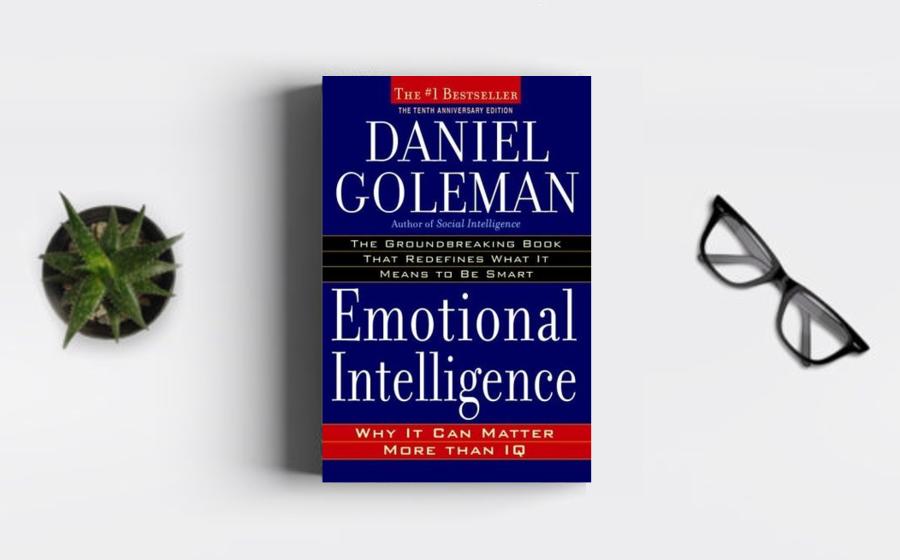"Emotional Intelligence" by Daniel Goleman serves as
a groundbreaking exploration of the role emotions play
in our lives and the profound impact of emotional
intelligence on personal and professional success.
Rooted in extensive research, the book inspires
individuals to harness the power of emotions, develop
self-awareness, and cultivate meaningful connections
with others. At its core, "Emotional Intelligence"
becomes a source of inspiration, guiding readers toward
a transformative journey of self-discovery and
interpersonal mastery.
The book
opens by introducing the concept of emotional
intelligence (EI) and its significance in navigating the
complexities of human interactions. Goleman highlights
the distinction between cognitive intelligence (IQ) and
emotional intelligence, asserting that EI plays a
crucial role in determining life outcomes. This
foundational exploration becomes an inspiration for
readers to recognize the profound impact of emotions on
their lives and to appreciate the value of cultivating
emotional intelligence.
Goleman identifies five key components of emotional
intelligence, laying the groundwork for a holistic
understanding of this skill set. The components include
self-awareness, self-regulation, motivation, empathy,
and social skills. This comprehensive approach becomes
an inspirational framework, guiding readers to develop a
well-rounded emotional intelligence that encompasses
self-mastery and effective interpersonal relationships.
The exploration of self-awareness as the
cornerstone of emotional intelligence becomes an
inspirational journey of self-discovery. Goleman
emphasizes the importance of understanding one's own
emotions and recognizing their impact on thoughts and
actions. The realization that self-awareness is the
foundation for personal growth and effective
decision-making inspires readers to embark on a journey
of introspection and self-reflection.
"Emotional Intelligence" delves into the concept of
self-regulation, emphasizing the ability to manage and
control one's emotions effectively. Goleman presents
self-regulation as a source of personal power, enabling
individuals to respond thoughtfully rather than react
impulsively. This insight becomes an inspiration for
readers to cultivate emotional resilience, navigate
challenges with composure, and foster a sense of balance
in their lives.
Goleman explores the
motivational aspect of emotional intelligence,
presenting passion and perseverance as essential
components of success. The concept that intrinsic
motivation, fueled by a sense of purpose and enthusiasm,
leads to greater achievements becomes an inspiration for
readers to align their goals with their values. By
cultivating a motivated mindset, individuals are
inspired to overcome obstacles, pursue excellence, and
find fulfillment in their endeavors.
The book
underscores the significance of empathy in fostering
meaningful connections with others. Goleman defines
empathy as the ability to understand and share the
feelings of others, transcending personal perspectives.
The exploration of empathy becomes an inspiration for
readers to cultivate a deeper understanding of the
emotions and experiences of those around them. By
developing empathetic connections, individuals
contribute to a more compassionate and harmonious social
environment.
Goleman examines
social skills as a key component of emotional
intelligence, highlighting the importance of effective
communication and collaboration. The concept that adept
social skills contribute to successful relationships,
leadership, and teamwork becomes an inspiration for
readers to enhance their interpersonal capabilities. By
honing social skills, individuals are inspired to
navigate social dynamics with finesse, build positive
relationships, and contribute positively to their
communities.
The book illustrates the far-reaching
impact of emotional intelligence in both personal and
professional domains. Goleman presents case studies and
examples that demonstrate how individuals with high
emotional intelligence excel in various aspects of life,
from leadership and teamwork to conflict resolution and
resilience. This exploration becomes an inspiration for
readers to envision the transformative potential of
developing their emotional intelligence in enhancing
their overall well-being and success.
Goleman explores the
neurological basis of emotional intelligence, delving
into the brain's capacity for change and adaptation. The
concept of neuroplasticity becomes an inspiration,
suggesting that individuals can actively shape their
emotional intelligence through intentional practices and
habits. By understanding the malleability of the brain,
readers are inspired to embark on a journey of
continuous learning and self-improvement.
The book examines the
role of emotional intelligence in effective leadership,
emphasizing the importance of leaders who can understand
and manage their emotions while inspiring and
influencing others. Goleman presents a compelling case
for leadership that prioritizes empathy, self-awareness,
and interpersonal skills. This exploration becomes an
inspiration for aspiring and current leaders to
cultivate emotional intelligence as a cornerstone of
authentic and impactful leadership.
Goleman addresses the
application of emotional intelligence in education,
advocating for the integration of EI skills in the
learning process. The concept that emotional
intelligence contributes to academic success, social
competence, and overall well-being becomes an
inspiration for educators, students, and parents. By
recognizing the importance of emotional intelligence in
the educational journey, individuals are inspired to
prioritize the development of these skills for a more
holistic and enriching learning experience.
The book explores the role
of parents and educators in nurturing emotional
intelligence in children. Goleman emphasizes the lasting
impact of childhood experiences on emotional development
and presents a vision for a more emotionally intelligent
future generation. This exploration becomes an
inspiration for caregivers to prioritize the emotional
well-being of children, fostering an environment that
cultivates self-awareness, empathy, and interpersonal
skills.
Goleman
delves into the relationship between emotional
intelligence and mental health, presenting emotional
well-being as a key component of overall psychological
health. The concept that emotional intelligence
contributes to resilience, stress management, and
positive mental health becomes an inspiration for
individuals seeking holistic well-being. By recognizing
the interconnectedness of emotional intelligence and
mental health, readers are inspired to prioritize
practices that enhance both aspects of their lives.
"Emotional Intelligence" emerges as an inspirational guide for personal transformation, urging readers to harness the power of emotions and cultivate a heightened awareness of their emotional intelligence. Daniel Goleman's exploration of self-awareness, self-regulation, motivation, empathy, and social skills becomes a roadmap for individuals seeking to enhance their emotional intelligence in both personal and professional realms.






